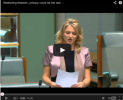Video: Melissa Parke MP - speech on how restricting our freedom and privacy won't protect us from terrorism
"This is a nation which has been tested in adversity, which has survived physical destruction and catastrophic loss of life. I do not underestimate the ability of fanatical groups of terrorists to kill and destroy, but they do not threaten the life of the nation. Whether we would survive Hitler hung in the balance, but there is no doubt that we shall survive Al-Qaeda. The Spanish people have not said that what happened in Madrid, hideous crime as it was, threatened the life of their nation. Their legendary pride would not allow it. Terrorist violence, serious as it is, does not threaten our institutions of government or our existence as a civil community.
Published on Wednesday, 01 October 2014 10:44
... The real threat to the life of the nation, in the sense of a people living in accordance with its traditional laws and political values, comes not from terrorism but from laws such as these. That is the true measure of what terrorism may achieve. It is for Parliament to decide whether to give the terrorists such a victory."
Tony Abbott made a speech to the IPA in 2012 in which he referred to the Coalition as the "freedom party". However, as Prime Minister Mr Abbott now believes that "the delicate balance between freedom and security may have to shift" and that "there may be more restrictions on some so that there can be more protection for others."
I do not support a number of key elements in this Bill, and I am aware there are further even more controversial Bills coming before the parliament in the near future.
I question the premise of the government's general approach to this area of policy, which is essentially that freedoms must be constrained in response to terrorism; and that the introduction of greater obscurity and impunity in the exercise of government agency powers that contravene individual freedoms will both produce, and are justified in the name of, greater security.
So far the debate on this issue has occurred within a frame that posits a direct relationship between, on the one hand, safety and civility in our everyday lives and, on the other, the powers that impinge upon and make incursions into individual freedom.
If we want to continue our lives free from terrorism and orchestrated violence — so the argument goes — we have to accept shifting the balance between freedom and constraint away from the observance of basic rights and towards greater surveillance, more interference, deeper silence.
Let me say that no one should be fooled into believing it is as simple as that.
The truth is that the remarkable peace, harmony, and security we enjoy in Australia is in fact produced and sustained by our collective observance of freedoms and human rights, rather than existing in spite of such values and conditions. It is wrong to say that we have been complacent about security on two counts. First, because we have strong, well-resourced, and competent security agencies, and second because our commitment to a way of life that puts faith in freedom, respect and tolerance, that puts faith in democracy and the rule of law, is itself productive of peace and shared security.
These are the reasons we must be so careful when we legislate to constrain those freedoms — because contrary to the reductive argument that says we're making a straight trade of less freedom for more safety, the reality is likely to be, and indeed has proved to be many times in the past, that constraining our fundamental liberties achieves nothing more than making us less free and in fact does ourselves harm through licensing the abuse of powers.
In the wake of the past few weeks' delivery by government, assisted by many media outlets, of "existential threat" and "panic/don't panic" messages, many people in the Australian community feel understandably confused and anxious. Members of Australia's Muslim communities may fear that the PM's 'restrictions on some' message applies particularly to them. If that is the case, then surely it is an approach that can only foster fear, mistrust and division, the very opposite of what is needed in terms of investing in community harmony, safety and human security in its broadest sense.
[Speaker], I recognise the process by which this Bill has come forward – and of course I understand that it contains a number of amendments to the Australian Security Intelligence Organisation Act that represent unobjectionable adjustments put forward off the back of the Report of the Inquiry into Potential Reforms of Australia's National Security Legislation.
I am also grateful for the recent consideration of the draft Bill provided by the Joint Standing Committee on Intelligence and Security (JCSIS), and I believe the amendments the Committee has recommended represent improvements – but not, in my view, sufficient improvements.
One critical point to grasp is the fact that the proposed laws are not a response to recent events involving the emergence of Islamic State, and the existence of people with criminal intentions based on their adherence to an extreme and deranged world-view.
It was a surprise therefore to see the editorial in The Australian on Monday where, under the heading 'Homegrown terror threat needs new tools to fight it', it rushed to conclude, "The new counter-terrorism laws are not an attack on free speech; they are a protection against an evolving threat" before acknowledging that "Any new counter-terrorism laws should be scrutinised by the parliament" and that "There is also a role for the media and other non-government groups, to offer analysis of proposed laws alongside laws currently operating".
That analysis and commentary certainly should be occurring, but it's hard not to have the sense that there is too much fierce agreement in this space at the moment as a result of people believing that we currently face some completely new and unprecedented terror threat.
The reality is — as we have seen from very well publicised operations recently — that law enforcement agencies have clearly been able to operate effectively on the basis of existing laws and there has not been convincing evidence of inadequacies in the existing legal framework that warrant the broad extensions of powers we see here. I am particularly concerned that this Bill entrenches and amplifies the lack of protection for whistleblowers regarding intelligence information and penalise with up to 10 years jail the legitimate actions of journalists and others doing their jobs in holding the government to account in the public interest.
There have been numerous examples of governments, defence, intelligence and law enforcement agencies here in Australia and elsewhere abusing their powers that have only come to light via Wikileaks, Edward Snowden and other whistleblowers regarding for instance the improper mass surveillance of civilians, the misuse of our aid program, and spying on foreign governments, including for the commercial benefit of corporations.
There are concerns that the legislation does not make any distinction between someone acting to sabotage a security intelligence operation and potentially putting security officers' lives at risk, which should rightly attract significant penalties, and persons disclosing information in the public interest where no such danger is present, but which may for instance be politically embarrassing.
It is no comfort from the Explanatory Memorandum that there will be a prosecutorial discretion to consider the public interest when deciding whether to prosecute a person — this kind of consideration should attract a specific exemption in the legislation — otherwise there is a very real danger that the provisions will produce a chilling effect on the willingness of the media to report legitimate matters of public interest.
We are assured that the significant impunity for breaking the law that is granted to security officials engaged in SIOs only applies when the officers are carrying out their duties as authorised and is not a green light for corruption or abuse of power. It is unsatisfactory in my view that the external oversight of special intelligence operations is limited to the Inspector-General of Intelligence and Security, rather than the more extensive oversight that applies to the AFP's controlled operations. The Member for Denison has highlighted the deficiencies in Australia's oversight of intelligence services relative to other countries such as the UK.
On the question of press freedom and media scrutiny, the editorial in The West Australian yesterday took issue with the new specific provisions, arguing that "they fail to strike a balance that does not unduly limit the ability of journalists to report on matters of national security. Any controls of this sort must be carefully considered and minimised. In this instance, there is a concern that the impetus to act on the terrorist threat may have led to the proposed laws being rushed and not considered as fully as they might have been."
And I would contrast the curious yet telling gulf between the nicely timed, neatly packaged and government facilitated media access to the recent AFP anti-terror operations and the utter silence, stonewalling and denial of access to operations that involve asylum seekers.
On this I agree with Mark Day, who wrote in Monday's Australian that,
"Last week we saw much commentary about how state and federal police provided on-the-spot video and still pictures of their raids against a terror group believed to be planning a random beheading in Australia.
How fortunate it was for the government that the raids came precisely as the parliament was considering new anti-terror powers — tougher laws to protect our freedoms by removing them. Raids of this nature involving 800 coppers for one arrest are obviously newsworthy. Police PRs were beside themselves with delight. You want pictures? How many? They fed the narrative of a government alert and anything but insouciant.
Now make the obvious comparison. For more than a year the government has refused to give any detail about any "on sea" activity related to people smuggling or asylum-seekers. This is because secrecy suits it. Secrecy is the government's starting point."
I understand that one of the legitimate bases for this Bill is the necessary adjustment to cover the kinds of technological change that have occurred over the last twenty years and I note the considered comments of the Shadow Attorney-General in this regard. I nevertheless have concerns about the scope of the provisions, especially in relation to computers and computer networks, including access to third-party hardware or communications. These provisions are the equivalent of a physical search warrant for a house that allows you to search an arbitrary number of other houses.
The JSCIS Report notes that public submissions were made by the Gilbert + Tobin Centre of Public Law calling for two categories of improvement in this area: the first being a 'minimal intrusion' test requiring other options for acquiring the required intelligence to have been used before ASIO has recourse to a computer network or third-party asset or communication; and the second being a further refinement in terms of scope so that a warrant would only access those parts of a target computer that are reasonably necessary for the acquisition of the relevant intelligence.
Unfortunately neither of these sensible proposals were taken up as recommendations. Instead the broad requirement that access must be 'reasonable in all the circumstances' was considered sufficient.
In my view, this is one of the clear areas where we may be licensing the potentially improper infringement of privacy and the possible misuse of personal information and communications without due consideration to the dangers involved, and without due care and restriction when it comes to those powers.
For an example of how this government regards the so-called balance between security and freedom, one can look to the proposed abolition of the Independent National Security Legislation Monitor. The Prime Minister announced the abolition of this critical office and function earlier this year as part of its 'war against red-tape'. Other casualties of this bizarre war of self-harm include environmental protections, financial services safeguards, and the framework to address climate change and encourage the development of renewable energy. In this way, the so-called war on red tape is unpicking the vital threads of our social fabric, our social compact.
With this Bill, the essential oversight of security legislation and powers is being undermined when it should be strengthened.
As others have noted, the Attorney-General was an active member of the Joint Standing Committee on Intelligence and Security when the Committee issued a report with respect to the very legislation we debate here, calling for the assessment of the draft bill by the Independent National Security Legislation Monitor. Of course, thanks to the government, that position has been vacant since April, and was to be scrapped.
I am glad that as a result of the outcry on this aspect of security oversight in particular, the government has reversed its position – though unfortunately not in time for this Bill to have been appropriately scrutinised.
I believe that at the very least this legislation should incorporate sunset clauses so that the provisions can be subject to review and discontinuance if not found to be necessary.
[Speaker], I want to conclude by returning to the point I made at the beginning about what is really at issue when we expand the capacity and power of state agencies to infringe upon the privacy and freedom of citizens, and at the same time constrain the ability of citizens to examine and discuss the use of those powers.
There is a lot of talk about the danger of complacency when it comes to security threats, including terrorism. I don't see evidence of that complacency, and none has been put forward. Australia is a remarkably secure and peaceful nation. Our law enforcement, intelligence, and defence agencies and personnel do excellent work on our behalf.
If there is any complacency, it is in relation to the very real dangers that lie in failing to recognise, value and speak up for our fundamental rights, values and freedoms. We have seen what happens when state agencies exercise improper power without effective safeguards; without effective oversight and accountability mechanisms.
We'd do well to reflect upon this now as we consider changes in this Bill and in others that seek to re-set our laws and values in ways that may not only be ill-designed to protect us from the dangers and horrors we seem inclined to over-state, but might in fact wear and fray the fabric of our freedom, trust, and faith in government.


 Federal Caucus has carried a motion to have the Caucus Live Animal Export Working Group develop a model for an Office of Animal Welfare. We know of two MPs who actively support this motion and would like to hear from any others. Kelvin Thomson and Melissa Parke, respectively MPs for Wills in Victoria and Fremantle in West Australia support this approach.
Federal Caucus has carried a motion to have the Caucus Live Animal Export Working Group develop a model for an Office of Animal Welfare. We know of two MPs who actively support this motion and would like to hear from any others. Kelvin Thomson and Melissa Parke, respectively MPs for Wills in Victoria and Fremantle in West Australia support this approach.
Recent comments